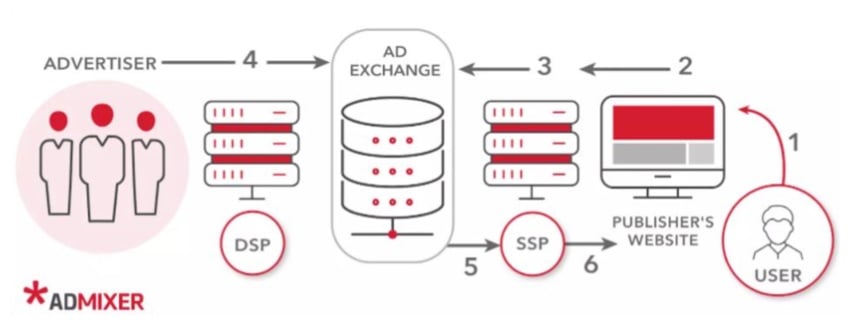Supply side platform or SSPs are part of a programmatic advertising system that also involves demand side platforms or DSPs.
%20What%20It%20Is%20and%20How%20It%20Works%20in%20Advertising.jpg?width=1200&height=627&name=Supply%20Side%20Platform%20(SSP)%20What%20It%20Is%20and%20How%20It%20Works%20in%20Advertising.jpg)
How Does an SSP Work and How Does it Differ from a DSP?
Supply side platforms aggregate and sell advertising spaces and impressions available on websites and applications, detailing some of their characteristics, such as the formats they accept.
Simultaneously, demand side platforms gather requests from advertisers seeking advertising spaces to display their ads and specify the particularities these spaces must have. For example, they indicate whether to include or focus on a particular audience, and on what devices and formats the content should appear.
Ultimately, the buying and selling of spaces and impressions take place in marketplaces called Ad Exchanges, environments where the supply provided by SSPs intersects with the demand from DSPs. These transactions occur through a real-time bidding system known as Real Time Bidding (RTB). However, there are also other options to purchase advertising spaces without going through the Ad Exchange, such as Private Marketplaces.
Types of Supply Side Platforms
SSPs play a fundamental role in programmatic advertising, and they can be classified based on the role they play in the programmatic advertising ecosystem, i.e., whether they are integrated into an Ad Exchange or function independently. They can also be classified based on their focus, such as whether they are generalist SSPs or specialized in video, audio, or mobile devices, among others. For instance, AppLovin specializes in selling advertising inventory for mobile devices.
Among the major generalist SSPs, we can find Google Ad Manager, OpenX, Magnite, PubMatic, or Index Exchange.
What Are the Advantages of SSPs?
As you can imagine, programmatic advertising and the use of these technologies offer many advantages for media outlets. Here are some of them:
- Increases the number of potential buyers of advertising spaces because it is possible to reach a larger number of advertisers.
- Automates the sales process and reduces the need for intermediaries such as agencies and salespeople.
- Automation also reduces bureaucracy and management times.
- The exchange of data between media outlets and advertisers is constant, improving the performance and management of advertising spaces, as well as their profitability.
In summary, the supply side platform (SSP) allows for the efficient, real-time, and profit-maximizing automation of advertising space sales.
Social Account Manager at Cyberclick. Le apasiona el marketing, las redes sociales, leer y escribir.
Social Account Manager at Cyberclick. Passionate about marketing, social media, reading and writing.






Leave your comment and join the conversation